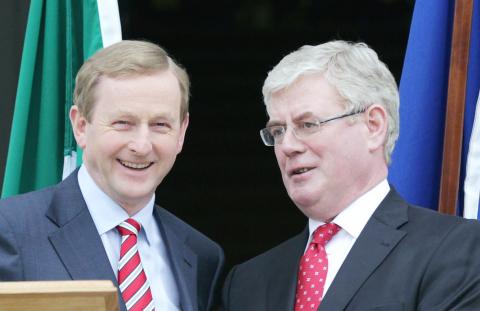Irish voters have backed the EU fiscal pact by a large majority, final referendum results showed on Friday, in what Prime Minister Enda Kenny hailed as a “powerful signal to the world.”
Sixty percent of voters were in favor of Ireland ratifying the pact, which is designed to shore up the turmoil-hit eurozone by penalizing countries that fail to keep their deficits in check.
“The Irish people have sent a powerful signal around the world that this is a country that is serious about overcoming its economic challenges,” Kenny said after the final ballots were counted.

Photo: AFP
“The clear and decisive verdict of the Irish people will help to create the stability and certainty that investors in Ireland need.”
The result comes as a huge relief to Kenny’s debt-laden government as only countries that ratify the pact will have guaranteed access to the EU’s new permanent bailout fund.
It will also spare the EU a headache, as a “no” vote could have fueled a growing backlash in Europe against austerity measures.
EU President Herman Van Rompuy hailed the vote as a key step towards Europe’s economic recovery.
“This result is an important step towards recovery and stability,” he said in a statement.
German Chancellor Angela Merkel welcomed Ireland’s backing of the fiscal pact as “good news for Ireland and Europe.”
Ireland was forced to accept an 85 billion euro (US$105 billion) bailout by the EU and IMF in 2010, and the “no” camp sought to harness public anger against the spending cuts and tax rises brought in as part of the deal.
Opponents labeled the fiscal pact an “austerity treaty” as it empowers the EU to fine countries that overspend.
Kenny said he had spoken to Merkel, French President Francois Hollande and Spanish Prime Minister Mariano Rajoy on Friday about “a number of issues” arising from the Irish “yes” vote.
Although pre-referendum opinion polls had predicted a clear victory for the “yes” campaign, only half the 3.1 million-strong electorate turned out to vote, raising fears that the low turnout could help the “no” camp.
However, most voters appeared to accept the government’s warning that if Ireland did not ratify the pact, it would not be able to access the European Stability Mechanism (ESM), the permanent rescue fund that comes into force next month.
Ministers have warned that they may need to access the ESM when Ireland’s current bailout package — which it required after its property bubble burst and the economy came close to collapse — expires next year.
Sonia Pangusion, analyst for Ireland at IHS Global Insight consultancy firm, said the “yes” vote was “good news for the future of the country.”
“It sends a positive message to the markets — a message that Ireland is determined to be part of the euro, assuming all the painful consequences of such decision.”

IN THE AIR: While most companies said they were committed to North American operations, some added that production and costs would depend on the outcome of a US trade probe Leading local contract electronics makers Wistron Corp (緯創), Quanta Computer Inc (廣達), Inventec Corp (英業達) and Compal Electronics Inc (仁寶) are to maintain their North American expansion plans, despite Washington’s 20 percent tariff on Taiwanese goods. Wistron said it has long maintained a presence in the US, while distributing production across Taiwan, North America, Southeast Asia and Europe. The company is in talks with customers to align capacity with their site preferences, a company official told the Taipei Times by telephone on Friday. The company is still in talks with clients over who would bear the tariff costs, with the outcome pending further

A proposed 100 percent tariff on chip imports announced by US President Donald Trump could shift more of Taiwan’s semiconductor production overseas, a Taiwan Institute of Economic Research (TIER) researcher said yesterday. Trump’s tariff policy will accelerate the global semiconductor industry’s pace to establish roots in the US, leading to higher supply chain costs and ultimately raising prices of consumer electronics and creating uncertainty for future market demand, Arisa Liu (劉佩真) at the institute’s Taiwan Industry Economics Database said in a telephone interview. Trump’s move signals his intention to "restore the glory of the US semiconductor industry," Liu noted, saying that

NEGOTIATIONS: Semiconductors play an outsized role in Taiwan’s industrial and economic development and are a major driver of the Taiwan-US trade imbalance With US President Donald Trump threatening to impose tariffs on semiconductors, Taiwan is expected to face a significant challenge, as information and communications technology (ICT) products account for more than 70 percent of its exports to the US, Chung-Hua Institution for Economic Research (CIER, 中華經濟研究院) president Lien Hsien-ming (連賢明) said on Friday. Compared with other countries, semiconductors play a disproportionately large role in Taiwan’s industrial and economic development, Lien said. As the sixth-largest contributor to the US trade deficit, Taiwan recorded a US$73.9 billion trade surplus with the US last year — up from US$47.8 billion in 2023 — driven by strong

STILL UNCLEAR: Several aspects of the policy still need to be clarified, such as whether the exemptions would expand to related products, PwC Taiwan warned The TAIEX surged yesterday, led by gains in Taiwan Semiconductor Manufacturing Co (TSMC, 台積電), after US President Donald Trump announced a sweeping 100 percent tariff on imported semiconductors — while exempting companies operating or building plants in the US, which includes TSMC. The benchmark index jumped 556.41 points, or 2.37 percent, to close at 24,003.77, breaching the 24,000-point level and hitting its highest close this year, Taiwan Stock Exchange (TWSE) data showed. TSMC rose NT$55, or 4.89 percent, to close at a record NT$1,180, as the company is already investing heavily in a multibillion-dollar plant in Arizona that led investors to assume